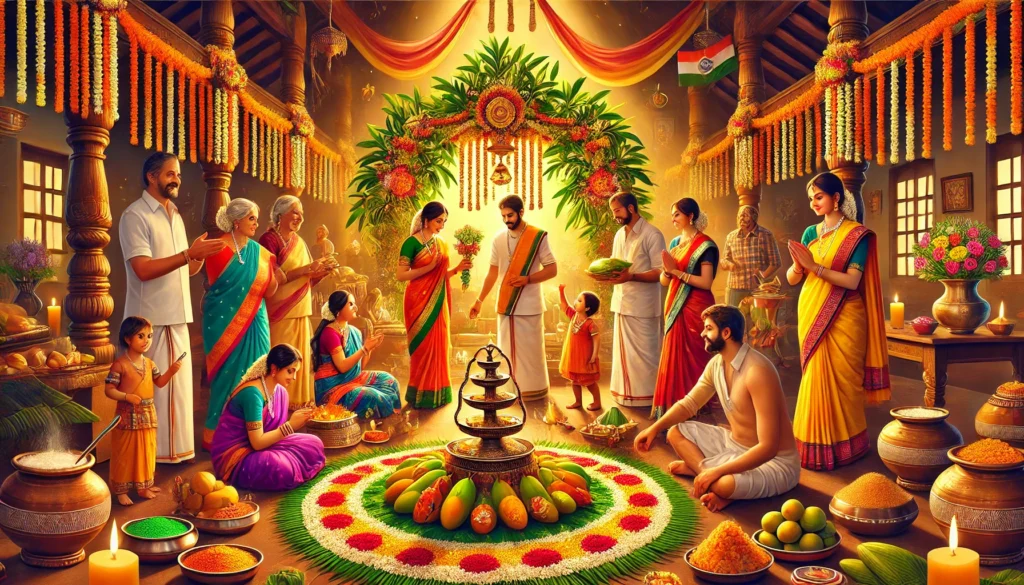
Ugadi, a vibrant festival celebrated in the Indian states of Andhra Pradesh, Telangana, and Karnataka, marks the New Year according to the Hindu lunisolar calendar. This auspicious day falls on the first day of the Chaitra month, usually in March or April, and is associated with the arrival of spring, symbolizing renewal, prosperity, and the promise of new beginnings. Ugadi, or “Yugadi” (where “Yuga” means age and “Adi” means beginning), is a time for people to embrace a fresh start, filled with optimism, hope, and joy.
Mythological and Cultural Significance
Ugadi has deep mythological significance. According to Hindu tradition, Ugadi marks the day when Lord Brahma, the creator of the universe, began the creation of the world. It is also the day associated with the start of the Kali Yuga, an era described in Hindu texts. For centuries, the festival has been a day to honor creation and the cycle of time, reminding people of the divine connection that links nature, humanity, and the cosmos.
In South India, Ugadi is particularly significant because it also marks the beginning of the agricultural year. Farmers eagerly await this day, as it signals the start of preparations for the coming sowing season. The celebration of Ugadi is also connected to the lush beauty of spring, as flowers bloom and nature rejuvenates, symbolizing abundance and new life.
Traditions and Rituals of Ugadi
Ugadi is celebrated with a range of rituals and customs that vary slightly between Karnataka, Telangana, and Andhra Pradesh, but there are shared practices that give the festival a cohesive spirit. Preparations often begin the day before, with people cleaning and decorating their homes, symbolizing a fresh start and the removal of negativity.
The day of Ugadi starts with an early morning oil bath, considered a purifying ritual. Wearing new clothes is also customary, symbolizing the shedding of the old year and welcoming the new one. After the bath, families gather to worship and offer prayers to deities for a prosperous year ahead.
Ugadi Pachadi: A Unique Festive Dish
One of the unique aspects of Ugadi is the preparation and sharing of Ugadi Pachadi, a special dish that combines six distinct tastes: sweet, sour, bitter, salty, spicy, and tangy. These tastes are represented by ingredients like jaggery, tamarind, neem flowers, salt, green chilies, and mango, respectively. Each flavor represents different emotions and experiences of life—sweetness for happiness, bitterness for sorrow, salt for fear, spice for anger, sourness for surprise, and tang for disgust.
This symbolic dish reminds people to embrace all emotions and accept the ups and downs of life with balance. The Pachadi represents life’s journey, reinforcing the idea that a fulfilling life includes all types of experiences.
Festive Celebrations and Regional Variations
Beyond the traditional rituals, Ugadi is also celebrated with cultural programs, music, and dance. In Karnataka, a literary event called “Kavi Sammelanam” brings poets together to recite and discuss their works. In Andhra Pradesh and Telangana, it is common for people to listen to the Panchanga Sravanam, or the annual forecast, where astrologers share predictions for the coming year. This tradition gives people insight into potential challenges and blessings, fostering hope and preparation for the new year.
The day also involves visits to family and friends, where people exchange greetings and share festive foods. Alongside Ugadi Pachadi, special dishes like pulihora (tamarind rice) and bobbatlu (sweet stuffed flatbread) are prepared, adding to the culinary joy of the day.
Embracing Ugadi’s Message of Renewal
Ugadi is more than a New Year’s celebration; it is a time to reconnect with family, reflect on life’s journey, and renew one’s commitment to growth and positivity. The symbolism of Ugadi encourages individuals to embrace each aspect of life, just as the ingredients of the Ugadi Pachadi remind people of the complex and rich tapestry of human experiences.
In a modern context, Ugadi remains a day to gather loved ones, honor traditions, and look toward the future with a renewed spirit. As people celebrate with ritual, food, and cultural festivities, Ugadi serves as a reminder of the resilience and optimism that the new year brings, encouraging everyone to greet the future with hope and open hearts.



